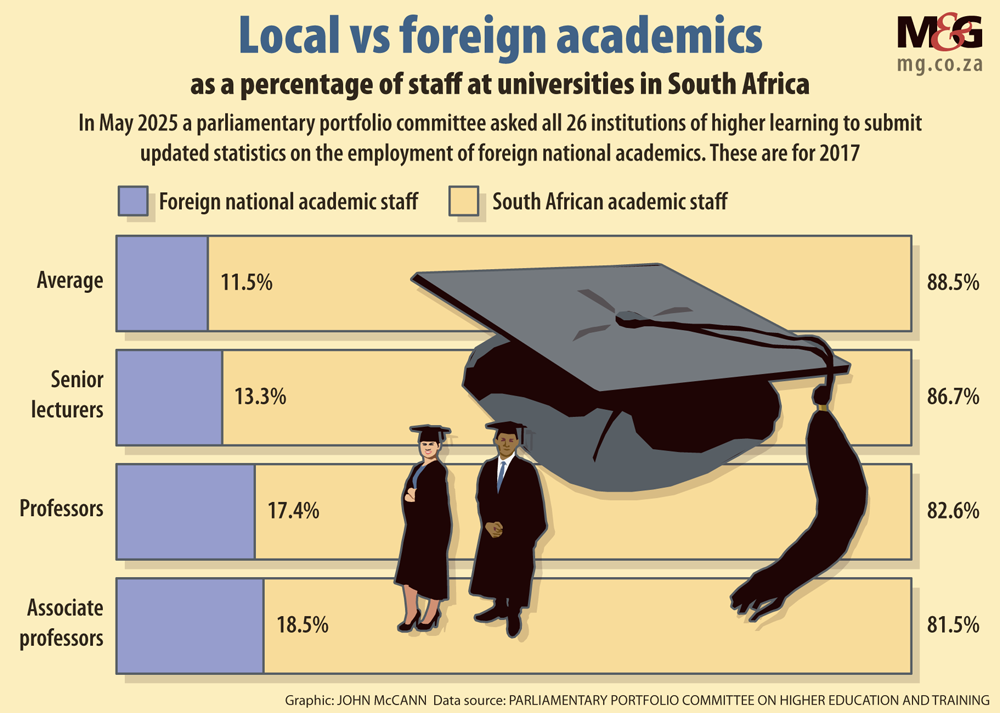Academics say claims by politicians and on social media are fueling xenophobia and could compromise their safety. Photo: Julian Stratenschulte/picture alliance /Getty Images
Claims by politicians that South African universities are hiring more foreigners than locals for posts are stoking xenophobia and creating an unsafe work environment, foreign academics say.
In parliament earlier this month, Patriotic Alliance MP Ashley Sauls took Pamela Zibuyile Dube, the vice-chancellor of the Central University of Technology in the Free State, to task for hiring a foreigner over a black South African woman for the position of dean.
Sauls told the Mail & Guardian that the party’s main concern was not that foreign nations are appointed, but that “[universities] are intentionally preferred over and above, qualified South Africans (by birth) who are either jobless or stagnant in junior positions as a result.”
He said the PA had proof of these instances, and alleged that the CUT created a department “to ensure a foreign national is appointed.”
The CUT refuted claims from the PA and affirmed that the university is committed to ensuring that the staff complement is diverse. The director of communications and marketing Maritz Daniel said that 81.6% of its employees are African, Coloured and Indian collectively, while 16% are White and 2.4% are foreign nationals. .
“CUT is aware of conflicting messages and figures regarding our [Employment Equity] statistics that have made their way into the media. It is important to highlight that these reports overlook our official submissions or have not sought direct contact to validate information with the university,” Daniel said.
Reports of this sparked outrage on social media, with some users accusing institutions including the University of Fort Hare, University of the Free State, the University of Pretoria and the University of the Witwatersrand of being biased against local academics.
Some posted lists of the names of foreigners they claimed had been hired.
“If a narrative such as this begins to take hold, if it becomes something that people believe to be true, then my concern is that that would generate a hostile environment — for international academics, specifically for African international academics — which can make life and work in South Africa profoundly difficult,” said Alf Nielsen, a Norwegian professor and director of the Centre for Asian Studies in Africa at the University of Pretoria.
“It’s important to note that it’s already quite challenging for most of us to be international academics, in terms of the difficulties that we experience with renewing our work permits, where rejection is more of a rule and an exception, despite the fact that you’ve worked at an institution in South Africa for quite a long time.”
One list which was posted on social media was of academics at the University of Pretoria’s Centre for Human Rights.
The director of the Department of Institutional Advancement at the university, Rikus Delport, said it “unequivocally rejects the false and misinformed commentary circulating regarding the staff composition of the Centre for Human Rights”.
“All academic staff are South Africans or permanent residents of the country and bring invaluable continental expertise that enhances the quality and relevance of the centre’s academic and advocacy work,” Delport told the Mail & Guardian.
“The diversity of the centre’s academic team is not incidental — it is essential. It directly reflects the centre’s mandate to engage with human rights issues across Africa with depth, credibility and authenticity,” he said.
He added that, overall, the university’s law faculty exceeded the government’s employment equity target.
Parliament’s portfolio committee on higher education said it was concerned about the University of the Free State’s employment of 141 foreign academics and 26 foreign support staff and in March visited institutions of higher learning in the province to assess whether transformation, legislation and employment equity policies were being implemented.
 (Graphic: John McCann/M&G)
(Graphic: John McCann/M&G)
Chairperson Walter Tebogo Letsie told the M&G that the committee “observed non-adherence legislation as some institutions employed foreign nationals in non-scarce skills positions, despite South Africans having qualifications, skills and competencies to execute the duties of such positions”.
“Why are South Africans overlooked, even when they meet the requirements?” he asked.
Following attacks that appeared on social media, the University of Fort Hare has condemned what it called dangerous acts of disinformation to mislead the public.
“There are no legal quotas restricting the hiring of international academic staff.
“Many emerging markets around the world strive for international academic representation of 10% to 15% as a means to promote diversity, spur innovation and collaborate on research,” it said in a statement.
“According to our most recent audited data, 81% of [our] academic staff are South African, while 19% are international.”
Asked about reports of his committee requesting information from universities on the number and qualifications of the international staff they employed, Letsie said it would seek to “ensure that their appointments adhere to the policy”.
He said that universities must take responsibility “where there is evidence of transgression” of the Employment Service Act.
Responding to the xenophobic comments circulating on social media, Letsie said the portfolio committee sought to ensure that foreign academics, who are welcome in the country, “meet all the legal requirements, have qualifications and that they have skills that South Africans do not”.
Senior journalism and media studies lecturer at Wits University, Zimbabwean-born Collen Chambwera, said that while the nature of social media was generally “anarchic” he was more concerned about false claims coming from political figures.
“Politicians are supposed to be more responsible than social media, you would think, and officialising something like listing names of foreign nationals who are employed by universities — I think it’s reckless,” he said.